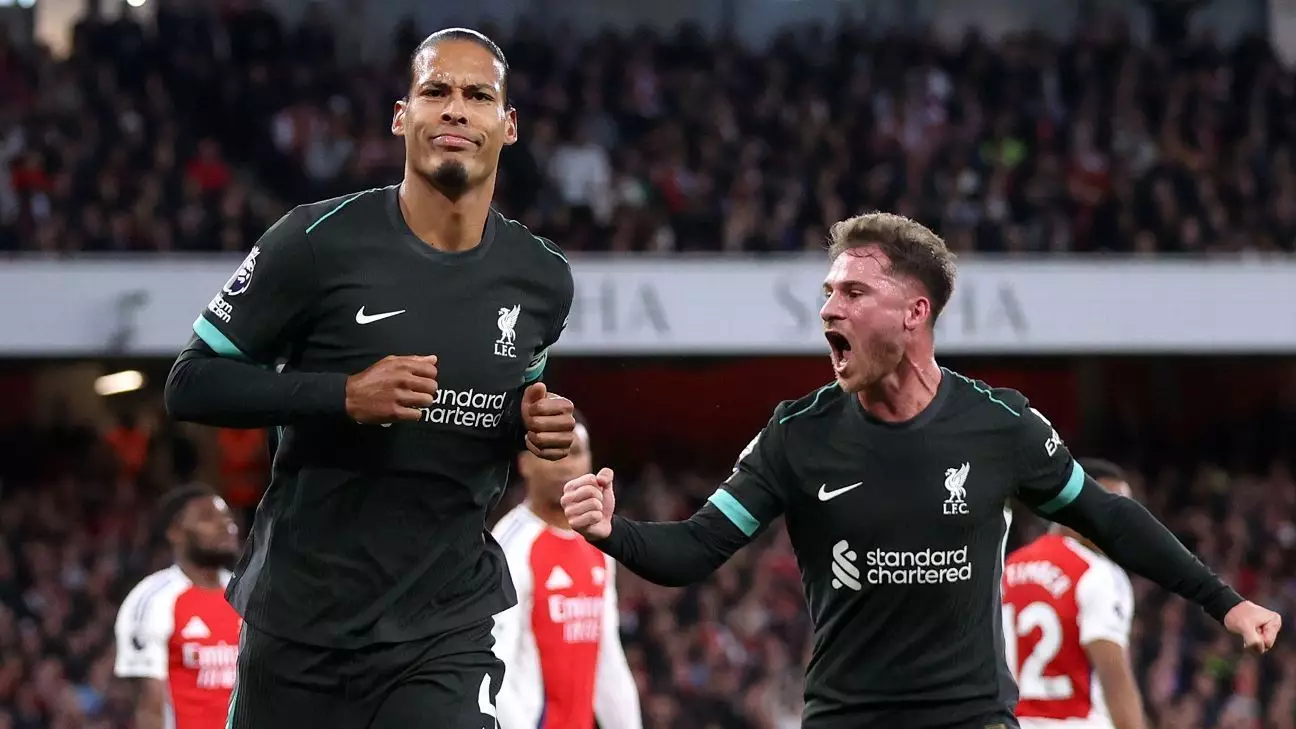In the heart of the Premier League’s high-stakes environment, Virgil van Dijk has expressed an intriguing perspective on his future at Liverpool FC. Following an intense match against Arsenal, where Liverpool managed a resilient 2-2 draw, van Dijk conveyed his intention to delay any contract negotiations until the end of the season, emphasizing the value of enjoying the journey. In a sport where contracts and transfers often dominate headlines, van Dijk’s approach seems refreshingly grounded, highlighting a focus on the present rather than the uncertainties of the future.
Van Dijk’s statement comes in the wake of a nail-biting clash against Arsenal at the Emirates Stadium. Liverpool’s fightback—twice equalizing against a fierce opponent—underscores his belief that staying present and enjoying the game is crucial. It is this mindset that helps players thrive in competitive scenarios. By adopting a “let’s see what happens” attitude, he may very well diffuse the pressure that typically accompanies contract discussions, allowing him and his teammates to channel their energies into securing results.
The match against Arsenal provided a fascinating snapshot of Liverpool’s current campaign. After a slow start, where they fell behind to Bukayo Saka’s ninth-minute goal, van Dijk equalized mere moments later. This pattern of resilience is vital in a title race, especially in a league as competitive as the Premier League. Liverpool’s ability to rebound after conceding points to a side like Arsenal—who have crafted a formidable team under Mikel Arteta—is indicative of a united squad possibly driven by a shared ambition.
Van Dijk showed remarkable poise during the match, especially considering he narrowly escaped a booking early on for a kicking incident. This unyielding spirit—where a player plays with urgency while maintaining composure—reflects the characteristics Liverpool embodies, even in challenging environments like the Emirates. The ability to come back twice from a deficit is more than mere luck; it speaks volumes about the mental fortitude of the players and their collective resolve.
While this draw may feel significant in the short term, van Dijk remains grounded, aware of the longer journey ahead as Liverpool chases Manchester City for the title. “We are in October,” he noted, reminding everyone that the season is long and unpredictable. In discussing the potential of teams like Arsenal facing pressure within the title race, he acknowledged the fluctuating nature of football where standings can shift dramatically week to week.
This broader perspective reveals an understanding that titles are not decided in single matches, but over time, through consistent performances and adversity. Such reflections are crucial for a player and a team hoping to reclaim top honors. Van Dijk’s experience as a former title-winner adds depth to his understanding of what it takes—mental resilience, tactical adaptability, and a steadfast belief in oneself and one’s team.
After the match, Liverpool manager Arne Slot praised his squad’s performance and energy levels, particularly noting the challenge of playing against Arsenal with less recovery time following international and Champions League duties. Similar to his captain, Slot reflected on the value of resilience, remarking on the significance of earning a point in a challenging away fixture.
Mohamed Salah, another crucial member of the squad, also encapsulated the essence of Liverpool’s dynamic spirit. His late equalizer not only maintained the team’s competitive edge in the title race but also highlighted his reliability as a world-class player. Salah’s ability to shine under pressure speaks to a broader narrative regarding the importance of “big-game players” in football, particularly in crucial matches where every point counts.
As he climbed the all-time Premier League scoring charts, matching the iconic Robbie Fowler, Salah’s contributions cannot be overstated. Having key players who can change the game at critical moments transforms a team’s fortunes. In conjunction with van Dijk’s defense and Slot’s tactical direction, Liverpool appears to have all the components necessary for a successful campaign, provided they can maintain their focus on the present.
As the season progresses, Liverpool’s future remains both uncertain and exciting. Van Dijk’s calm demeanor in the face of impending contract decisions suggests he recognizes the importance of passion for the game and the relationships forged on and off the pitch. His philosophy encapsulates a holistic approach—prioritizing enjoyment and competition over the looming distractions of contract negotiations.
Ultimately, as the team prepares for their next fixture against Manchester City, this blend of resilience, strategy, and emotional intelligence will be decisive. Van Dijk, Salah, and their teammates must remain focused, navigate the challenges of the season ahead, and embrace each match as an opportunity to enhance their legacy. In the game of football, where fortunes can shift rapidly, it is this mindset that may prove beneficial in Liverpool’s quest for silverware.

